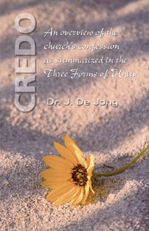Creeds and Confessions
“What do you believe about God?
About salvation and redemption? About the Ten Commandments?” These are the kinds of questions young people are confronted with in today’s climate of religious pluralism. This book—originally
designed as a course for public profession of
faith classes—has been structured to help young people answer these questions and to confirm them in their own faith. It presents
an overview of the continental Reformed confessions known as the Three Forms of Unity: the Heidelberg Catechism, the Belgic
Confession, and the Canons of Dort.Author: J. De Jong. Publisher: Premier Publishing, 1997. ISBN 0887560687.
May 13, 2015A close look at Christ as our chief Prophet, only High Priest, and eternal King. Also, the implications of this for the lives of Christians is explored.
May 7, 2015Report on a visit to Doornik – including the place where Guido de Brès was imprisoned.
May 1, 2015The Heidelberg Catechism is known for its warm, personal tone. In this speech the author explores why this Catechism uses personal pronouns, such as I, me, and my when it does.
April 30, 2015The Heidelberg Catechism, as a summary of God’s Word, is used regularly in the afternoon worship service of many Reformed churches. How can the preacher keep his catechism sermons vibrant when he comes back to the same Lord’s Days year after year?
April 29, 2015A close look at Christ as our chief Prophet, only High Priest, and eternal King. Also, the implications of this for the lives of Christians is explored.
April 7, 2015An article commemorating the 450th anniversary of the Heidelberg Catechism and focusing on LD 12
April 7, 2015The Heidelberg Catechism is known for its warm, personal tone. In this speech the author explores why this Catechism uses personal pronouns, such as I, me, and my when it does.
April 6, 2015Recorded during Conference 2014: “Correctly Handling the Word of Truth: Reformed Hermeneutics Today.” This address revisits the issue of the authority and function of the church’s creeds and confessions in the interpretation of Scripture. After reviewing the decline of, and challenges to a confessional hermeneutic, in the centuries after the Enlightenment, the more recent emergence of the “theological interpretation” of Scripture is explored. This speech offers a defense of a confessional hermeneutic in the face of contemporary challenges. Dr. Dean Anderson responds to this speech.
April 6, 2015An evaluation of need for, and process involved in, updating our confessions or writing new ones.
April 6, 2015A survey of the original preface of the Heidelberg Catechism, including the original motivation for writing it, and how this still applies today.
April 2, 2015Recorded during Conference 2014: “Correctly Handling the Word of Truth: Reformed Hermeneutics Today.” The first part of this speech will present a proposed structure for Jeremiah. A second part introduces and applies some critical methods to test the validity of the proposal. A third part assesses the profits and perils of the critical methods themselves and suggests what a Reformed Old Testament scholar can and cannot say. In this way the structure of the book of Jeremiah serves as a test case for the interplay of confessional integrity and quality control. A panel discussion follows this speech.
April 1, 2015







